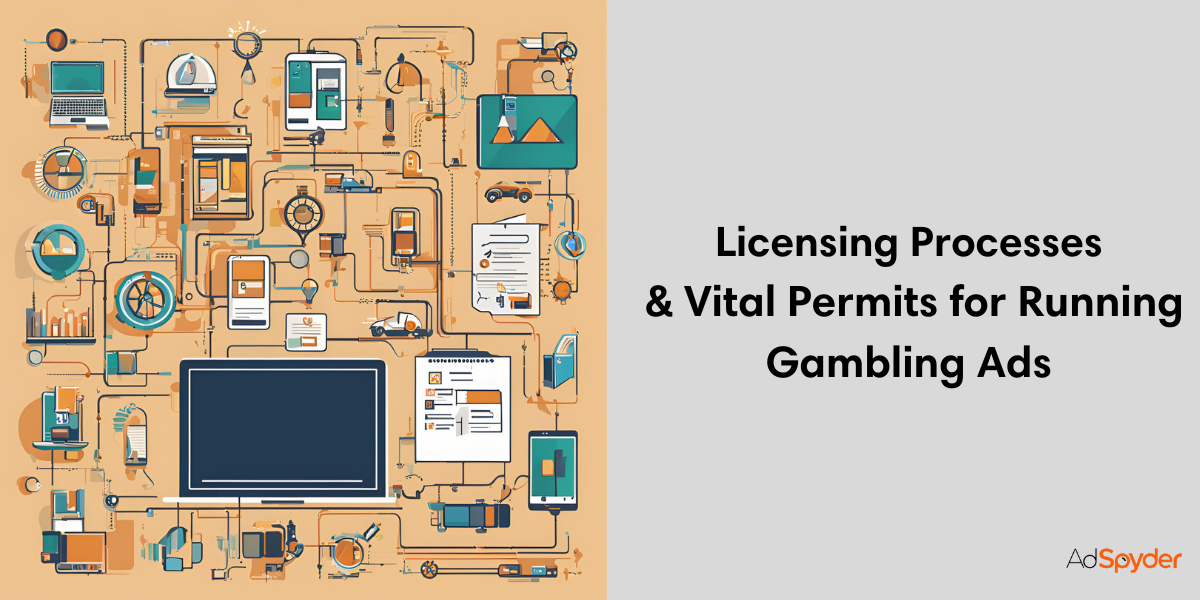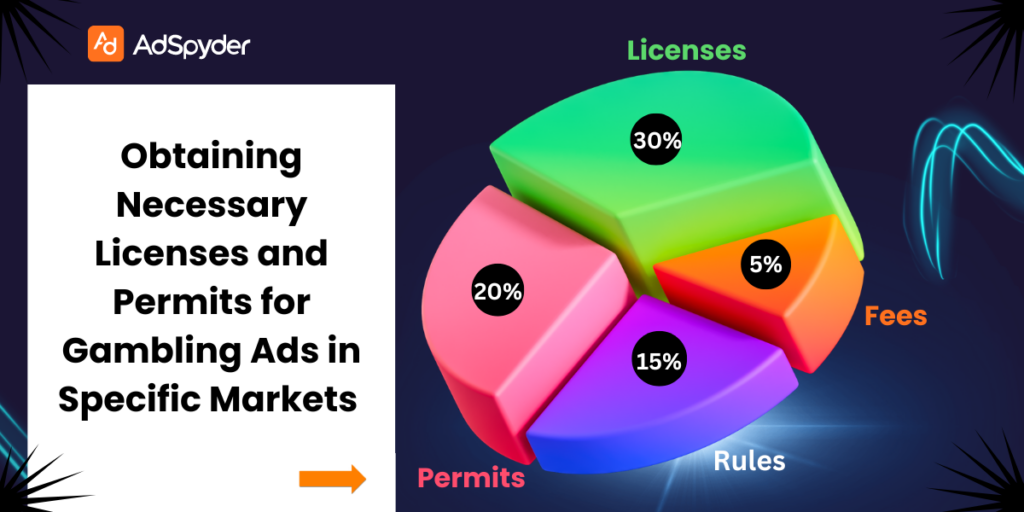In the fast-paced world of gambling advertising, where fortunes are wagered and user engagement is the ultimate goal, one critical aspect stands tall – obtaining the requisite licenses and permits, including permits for running gambling ads. This blog embarks on a journey to uncover the profound significance of licensing in gambling advertisements, the labyrinthine licensing processes entailed in various global markets, the art of treading cautiously through advertising restrictions, the vital role of flaunting license credentials in ads, and the enduring commitment to renewal and compliance checks. Through this expedition, advertisers can grasp the crucial importance of acquiring the appropriate licenses and permits, for it is this foundation that supports legality, trustworthiness, and a sustainable foothold in the fiercely competitive gambling industry.
Ready to Elevate your Marketing Strategy?
Licensing Processes & Vital Permits for Running Gambling Ads

In the realm of online gambling, borders matter, and each country boasts its own set of rules and prerequisites for advertising gambling products and services. Different regulatory bodies wield authority over gambling activities within each jurisdiction, and these governing entities are instrumental in bestowing permits for advertising, including permits for running gambling ads. The labyrinthine path to obtaining these licenses in gambling advertisements veers dramatically from one country to the next, necessitating a profound understanding of these subtleties for advertisers to navigate effectively.
Consider the United Kingdom, where the UK Gambling Commission dons the mantle of authority in licensing and overseeing gambling activities. Advertisers who wish to promote gambling products or services in the UK must embark on an application journey that is a rigorous test of their background, financial stability, and capacity to deliver fair and responsible gambling services. The commission scrutinizes proposed advertising materials to ensure strict adherence to UK advertising codes and guidelines, all while complying with UK ad restrictions.
In parallel, other countries such as Spain, France, Italy, and countless more boast their own regulatory bodies tasked with overseeing gambling activities and advertising, each with their unique licensing prerequisites and advertising restrictions, including LinkedIn ad restrictions, UK ad restrictions, Facebook ad restrictions, and Google ad restrictions. Building strategic alliances with neighborhood advertisers in these regions can in addition streamline compliance and make certain a smoother course via complex policies.
The UK Gambling Commission received a staggering 1,153 license applications in 2020.
Adhering to Advertising Restrictions
Licensing in gambling advertisements serves as the guardian of ethics and responsibility. Regulatory authorities wield their scepters to establish stringent advertising rules and guidelines, conceived to safeguard consumers and quell unethical practices. In pursuit of legality and responsibility, advertisers must unswervingly adhere to these restrictions, including meta advertising restrictions and various platform-specific ad restrictions.
In many countries, stringent rules govern the prohibition of gambling advertisements targeting minors. Advertisers shoulder the responsibility of ensuring that their ads neither target nor appeal to individuals below the legal gambling age. Conversion tracking tools additionally play a pivotal position in making sure that ads reach simplest their supposed audience, reinforcing responsible advertising and marketing efforts. Age verification processes emerge as a cornerstone of responsible gambling advertising, crafting a fortress that thwarts underage access to gambling advertisements and websites.
Consider Spain, where gambling advertising finds itself banned from the airwaves between the hours of 2 a.m. and 5 a.m., a protective measure aimed at vulnerable individuals and preventing the encouragement of excessive gambling behaviors during late-night hours.
Ads must not merely obey the law but should also tread the path of honesty, clarity, and transparency, adhering to Google ad restrictions, Facebook ad restrictions, and other platform-specific rules. To enhance engagement, advertisers are also turning to video infographics, which successfully present complicated facts in a digestible, visually appealing format. This journey requires advertisers to steer clear of false claims, hyperbolic assertions, and any form of information that possesses the potential to lead users astray concerning the nature of the gambling products or services.
A significant 75% of consumers consider a company’s privacy practices pivotal in influencing their trust.
Displaying License Information in Ads
Transparency is the beacon that guides users through the labyrinth of trust in the gambling industry. Inclusion of license information within gambling advertisements serves as an embodiment of an advertiser’s unwavering commitment to legality. This display demonstrates that the advertiser operates within the confines of the law. It shows they are armed with the necessary permits to deliver gambling services and products.
License information often comprising details such as the license number, the authority that issued the license and its validity period. It forms a shield that fortifies the credibility of advertisements. It also serves as a beacon of legitimacy that radiates trustworthiness. The licenses reassures users about the authenticity of the gambling service or product.
Beyond the showcasing of license information, advertisements may also intertwine responsible gambling messages. These messages champion the cause of responsible gambling behavior. It offers guidance and resources to individuals who may find themselves grappling with gambling-related issues.
A resounding 82% of consumers admit to being more likely to trust a company with their personal information if it is transparent about its usage.
Renewal and Compliance Checks
The acquisition of a license is not a mere milestone. It’s an ongoing journey that demands vigilance in compliance and renewal. This ensures adherence to LinkedIn, Google, Facebook, and other platform-specific regulations. Advertisers must remain attuned to the requirements and timelines for license renewal to avoid the quagmire of operating with an expired license. The compass of compliance checks must steer the ship of legality and responsibility.
In Italy, for instance, a gambling license must be refreshed every nine years. Failure to adhere to this renewal timeline could sound the death knell for gambling operations. This ushering in not only suspension but also considerable financial penalties.
Compliance checks entail the regular review of advertising materials to ensure that they align with the guidelines set forth by regulatory authorities. These checks encompass scrutinizing websites or platforms where ads find their canvas. It assures that all the information disseminated to users remains accurate and up to date. Implementing paid growth marketing strategies during these checks can help advertisers stay competitive while maintaining compliance.
Routine compliance checks, akin to the gears of a well-oiled machine, empower advertisers to promptly address potential pitfalls or discrepancies. They serve as custodians of adherence to licensing standards and enablers of swift resolutions to uphold the lofty standards dictated by regulatory authorities.
A towering 86% of consumers declare that transparency from businesses has acquired unprecedented importance.
Conclusion
The acquisition of necessary licenses and permits includes permits for running gambling ads. It represents the foundation upon which the edifice of legality, trustworthiness, and sustainability in the world of gambling advertising is constructed. Advertisers must not merely walk the path. They should also master the intricacies of the licensing processes. These can vary from one global market to another. The culmination of these endeavors ensures compliance with advertising restrictions. It also promotes the display of licensure credentials. It shows an unwavering commitment to renewal and compliance checks.
Prioritizing the licensing process and upholding the beacon of legal compliance shelters advertisers from the legal tempests that may brew. It also forges a reputation of responsibility and trustworthiness within the gambling industry. In the tumultuous sea of online gambling, competitive currents run deep. Here, the acquisition of licenses and permits distinguishes advertisers. This helps in their quest to build a reputable and enduring presence. The pursuit of necessary licenses and the adherence to regulatory guidelines imbue advertisers with the invaluable attributes of legality, transparency, and responsibility. This creates a win-win scenario for both advertisers and users within the realm of gambling advertising.
FAQs
The frequency of license renewal varies by jurisdiction, with some requiring renewal every few years. Advertisers must stay informed about renewal timelines to avoid legal issues.
Responsible gambling messages in ads promote ethical gambling behavior. It also provide information and resources to users who may experience gambling-related issues.
Compliance checks involve reviewing advertising content to ensure it adheres to legal and ethical standards. They are essential to avoid legal penalties and maintain the integrity of the gambling industry.
Displaying license information in ads demonstrates transparency and compliance with regulatory requirements, which helps build trust with consumers and authorities.
Licensing processes vary by country, with each jurisdiction having its own set of rules and regulations. Advertisers must understand and comply with these local requirements to operate legally.
Regulatory authorities oversee gambling activities and advertising, granting permits and enforcing advertising restrictions to protect consumers and maintain ethical standards.
Advertisers need licenses and permits. This is to ensure that their gambling advertisements comply with legal requirements. It also is to operate within the bounds of the law.




